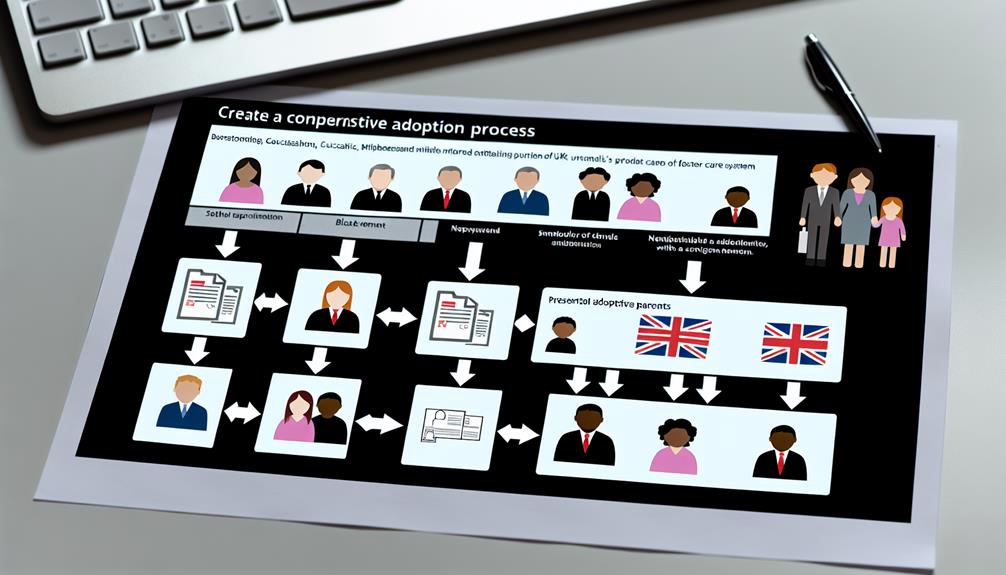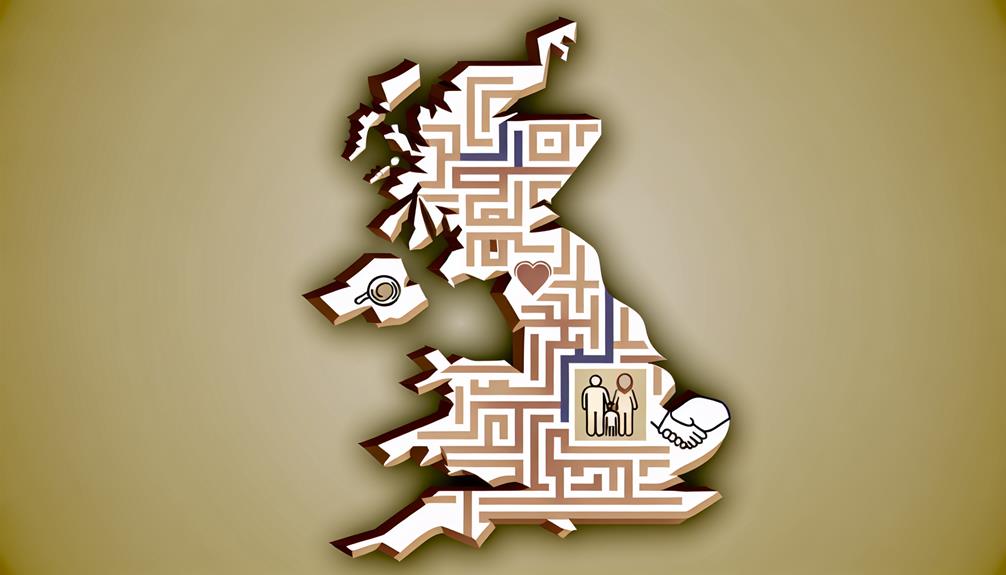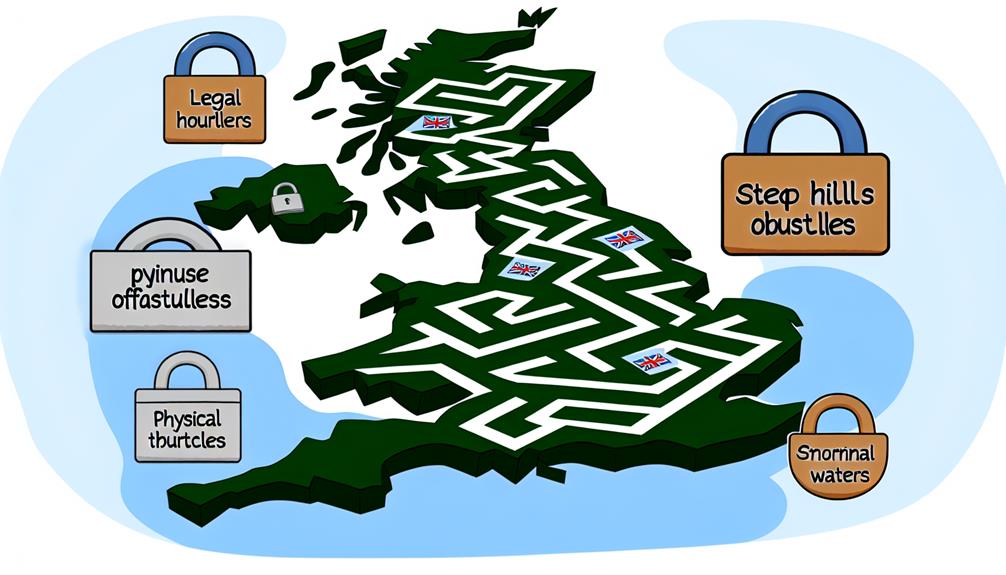The UK's foster care adoption process is unique for its strong emphasis on safeguarding the child's welfare. Robust policies underpin a framework that assesses you thoroughly, checks your legal background, and evaluates your health, lifestyle, and support system. You're then matched with a child, and the focus remains on their wellbeing throughout. It's more than just becoming a parent; you'll take part in training sessions, undergoing a detailed two-stage process that typically lasts six months. Even post-adoption, you are not left alone and ongoing support remains available. It's a journey where you'll continually grow and learn.
Key Takeaways
- The UK adoption process prioritizes child welfare, offering comprehensive resources like education and healthcare.
- UK's adoption system features a robust two-stage assessment process, ensuring potential parents are well-equipped.
- The UK allows anyone over 21, regardless of marital status or sexual orientation, to adopt.
- The UK's legal landscape for adoption is complex, requiring a nuanced understanding of laws like the Adoption and Children Act 2002.
- The UK places emphasis on emotional impact assessment, ensuring potential parents are emotionally stable and prepared for adoption.
Understanding UK Foster Care System

To fully grasp the UK foster care system, it's crucial that you understand it's not just about providing temporary care for children; it's an intricate, dynamic network dedicated to safeguarding and promoting the welfare of children in need. It's a detailed framework that's underpinned by robust child welfare policies, which are designed to protect and uphold the rights of every child.
One of the significant Foster Care Benefits is the provision of a safe, nurturing environment for children who've been removed from harmful situations. Children in foster care are given the opportunity to heal and grow in a supportive setting. They're provided with the necessary resources to thrive, including education, healthcare, and emotional support.
The UK's child welfare policies make it mandatory for local authorities to assess a child's needs and develop a care plan. This includes decisions about where the child will live and who'll look after them. The paramount consideration is always the child's welfare.
Basic Eligibility for Adoption
If you're considering adoption in the UK, it's important to understand the basic eligibility criteria that potential adoptive parents must meet. The journey to adoptive parenting requires patience and determination. It's essential to approach the process with a clear understanding of the adoption criteria in order to avoid potential setbacks.
| Eligibility Factor | UK Criteria |
|---|---|
| Age | You should be at least 21 years old. There's no upper age limit, but your health and vitality to care for a child are considered. |
| Health and Lifestyle | Your physical and mental health must be stable. Lifestyle factors, such as work-life balance and support network, are also assessed. |
| Living Arrangements | You must have a stable living arrangement. A child-friendly environment is key. |
| Legal Checks | You must pass a thorough background check, including a Disclosure and Barring Service (DBS) check. |
UK Adoption Process Steps

Having understood the eligibility requirements, let's now explore the step-by-step process of adopting a child in the UK. It all begins with an expression of interest to an adoption agency. This is followed by an initial visit where a social worker assesses your suitability and informs you about Adoption Support Services.
Next, you'll undergo a two-stage assessment process lasting approximately six months. Stage one involves checks and references, while stage two includes an in-depth assessment with your social worker. This is where your resilience, understanding of children's needs, and ability to care for a child are evaluated.
During this period, you'll attend Adoption Training. These sessions are designed to equip you with the skills and knowledge needed to handle the unique challenges of adoption. They cover topics such as attachment, loss, trauma, and identity.
Once approved, you'll be matched with a child whose needs you can meet. You then spend time getting to know the child before they move in. Post-placement, you'll receive ongoing support from the adoption agency to help you settle in. Remember, the process is thorough because the priority is the child's welfare.
Legal Aspects of UK Adoption
Exploring the legal aspects of UK adoption might seem intimidating, but rest assured, you're not alone in this journey. The primary piece of adoption legislation in the UK is the Adoption and Children Act 2002. This law, which replaced the Adoption Act 1976, modernized the legal framework for adoption, focused on the child's welfare as the paramount consideration.
Under this adoption legislation, anyone over the age of 21 can adopt a child in the UK, regardless of marital status, sexual orientation, or home-ownership status. However, the process is thorough, aiming to make certain that the child's best interests are always prioritized.
Another essential part of the legal aspects of adoption in the UK involves parental rights. Once an adoption order has been granted, all legal ties between the child and their birth parents are severed. The adoptive parents gain full parental rights and responsibilities. This shift in rights is significant, as it means that adoptive parents have the same legal rights and obligations as if the child were biologically theirs. Understanding these legal aspects is a vital step in your adoption journey.
Challenges in UK Foster Care Adoption

While starting on the journey of adoption, you may encounter certain challenges in the UK foster care system. The complexities of legal processes can be intimidating, often necessitating expert guidance.
Additionally, evaluating the emotional impact on all parties involved is a vital, yet intricate, part of the process.
Navigating Legal Complexities
Understanding the legal complexities can often be one of the most challenging aspects of the UK foster care adoption process. Navigating through legal terminology and understanding adoption laws is no easy feat.
You must familiarise yourself with terms such as 'placement order' or 'special guardianship'. Adoption laws in the UK are intricate and multifaceted, requiring you to comprehend the Children Act 1989 or Adoption and Children Act 2002. These laws guide the entire process, ensuring the child's welfare is paramount.
It's essential to seek legal advice and support throughout your journey. Remember, the process can be complex, but understanding the legalities is a crucial step. You're not alone; professionals are there to help you navigate.
Emotional Impact Assessment
Amid the intricate legalities, it's equally important to contemplate the emotional impact that foster care adoption can have on you and your family. This step involves conducting an emotional impact assessment, which requires your emotional resilience and psychological preparations. It's a process that gauges your readiness to handle the emotional roller coaster that comes with fostering and eventually adopting a child.
The assessment is designed to identify any potential psychological barriers that could hinder a successful adoption. It's not meant to deter you, but to make sure you're fully equipped to provide a stable and loving environment for your adoptive child. Remember, adoption is a lifelong commitment that demands emotional strength, patience, and understanding. So, take this assessment seriously as it's a critical part of the UK's unique adoption process.
Unique Features of UK Adoption
In exploring the UK adoption process, you'll notice several distinctive features that set it apart from other countries. A careful examination of adoption statistics reveals a system designed to cater to the unique cultural sensitivity of the diverse population it serves.
Some unique features of UK adoption include:
- Extensive pre-adoption training for prospective parents, guaranteeing they're well-equipped to provide a nurturing environment.
- The involvement of an adoption panel made up of experienced individuals from various fields. They review your application and make the final decision.
- Placement for Adoption order, a unique legal order that enables local authorities to place a child for adoption with specific adopters.
- Adoption Support Fund, a financial scheme aimed at ensuring adoptive families get the therapeutic services they need.
These features reflect a deep commitment to child welfare. They're designed to make certain that every child placed in an adoptive home has the best chance at a happy, stable life. Understanding these nuances can help you navigate the adoption process with confidence and clarity. Remember, adoption is a journey and the UK system is there to support you every step of the way.
Frequently Asked Questions
How Does the UK Foster Care Adoption Process Compare to That of Other Countries?
You'll find that UK's adoption process, compared to others, is unique due to adoption legislation differences. International comparison studies show UK's focus on child's welfare makes the process distinct and all-encompassing.
What Kind of Post-Adoption Support Is Available in the Uk?
In the UK, you're not alone post-adoption. Generous financial aid is available, easing the adjustment. Additionally, post-adoption counselling offers emotional support, helping you navigate through any challenges that arise. You've got a network of support.
How Does the UK Foster Care Adoption System Handle Cases of Special Needs or Older Children?
In the UK, you'll find robust support for special needs and older child adoption. There's extensive special needs training, and older child integration is approached with great care, offering a unique, supportive experience.
How Long Does the Average Process of Adoption Take in the Uk?
In the UK, the adoption process, including Adoption Eligibility assessment and Pre Adoption Training, typically takes around six to eight months. It's a thorough process ensuring the best fit for every child.
Are There Any Cultural or Societal Factors That Impact the Adoption Process in the Uk?
Yes, cultural norms and adoption stigmas in the UK greatly impact the adoption process. You'll find societal beliefs and prejudices may affect decisions and attitudes towards both potential adoptive parents and children within the system.
Conclusion
You've navigated the unique path of UK's foster care adoption, a journey filled with distinct legalities, stringent eligibility, and potential challenges. Yet, it's no coincidence that this process is meticulously designed to guarantee the child's utmost well-being. It's a proof of the UK's commitment to child welfare.
Remember, your patience and resilience throughout this process aren't just admirable, they're instrumental in changing a child's life. Truly, you're not just adopting a child, you're embracing a future.




